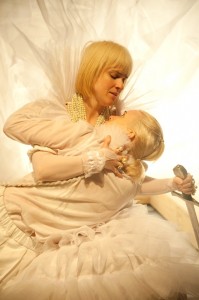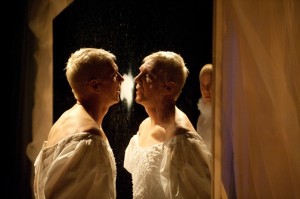theatre review: ‘orlando’
Tense, humorous, salacious and surreal. These words all ran through my head after seeing the Rabble’s Orlando at the Malthouse Theatre last week. Presented in association with the Melbourne Festival and Helium Productions, this adaptation of Virginia Woolf’s classic novel Orlando: A Biography (1928) is a visceral contemporary piece of theatre that expresses the unsettled and fast-paced world Woolf so evocatively crafted in her semi-autobiographical novel.
As soon as I entered the Malthouse’s experimental venue, the Tower, I knew I was about to see a play that pushed the boundaries of theatre. A floor lined with hard, white pebbles framed a pool of milky water cum stage, surrounded by a small cluster of unnumbered seats. Opening with gentle majesty to a soundtrack of a Chopin, Orlando soon descended into an intense theatre experience. The play inventively combined the plot of Woolf’s novel about an inhibited young man who transforms into a self-aware woman, with a pastiche of narratives from acclaimed female authors of the literary canon: Sappho, Queen Elizabeth I, Emily Dickinson, Gertrude Stein, and Woolf herself (from another of her novels, The Waves). The 90-minute production ran without an intermission, and managed to keep the attention of the audience for most of that time.
The three-strong cast matched the intimacy of the venue, a testament to the intuitive direction of Emma Valente. Dana Miltins captured the innocent yet impassioned nature of Orlando. Both Syd Brisbane and Mary Helen Sassman assumed several guises in the play, mainly the Elizabethan poet Nicholas Greene and Queen Elizabeth I herself respectively. Telling the story of the young Orlando, who is born male and transforms inexplicably into a woman, the play presents a powerful exploration of the ways which we are both defined and confined by our gender roles. The action played out largely through a series of monologues, some of which were more compelling than others.
The use of sound and scenery worked together to cultivate the confusing and unstable world inhabited by Orlando. In many instances, the soundtrack, which was the work of Valente, replaced the spoken word. Sound was employed intermittently to communicate Orlando’s sense of confusion and isolation, as well as the intense passion of the supporting cast. This was particularly successful early in the play when the then boy Orlando was largely mute, with sound and movement used in place of the voice he was yet to find. Queen Elizabeth’s speech boomed uncomfortably throughout the theatre, intentionally too loud – making the audience recoil in response to her reverberating voice. This theatrical device powerfully conveyed her dominance, in contrast with Orlando’s passionate yet fragile nature.
Kate Davis’ set and costume design, with its omnipresence of white, was also unsettling. Everything, from the colour of the water that filled the rectangular stage, the costumes and tulle backdrop, was a bleak off-white, made harsher by the dazzling reflection of stage lights. While white can symbolise purity, innocence, and even virginity – something Queen Elizabeth I was often associated with – in this instance it was ambiguous; at times contributing an ethereal atmosphere to the production, at others menacing in its starkness. The ambiguity reflected much about the protagonist and the play’s overall exploration of gender.
While the Rabble’s production of Orlando was a captivating theatre experience, I cannot say it was one I wholly enjoyed; I often found myself cringing as I saw Orlando move through the chaotic story. By the same token, I do not think I was supposed to enjoy it. As I watched the play, I felt Orlando’s passion and frustration. In many ways, being an audience member of Orlando was like reading a Woolf novel: enthralling, engaging, unsettling and, ultimately, thought-provoking.
Orlando is showing at the Malthouse Theatre until 27 October. For tickets and further information, head to the Malthouse’s website: http://www.malthousetheatre.com.au/
Photography by Sarah Walker
Do you love independent media? Can’t get enough of intelligent, thoughtful feminist content? Want to see writers actually get PAID for their work? Please donate to Lip through Pozible today, and help keep the mag alive!



